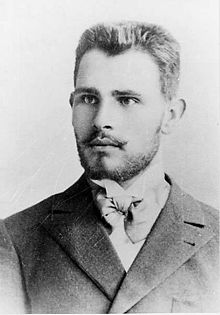Jonas Biliūnas
Jonas Biliūnas (born April 11, 1879 in Niuronys near Anykščiai ; † December 8, 1907 in Zakopane , Poland ) was a Lithuanian writer and poet and an exponent of the national revival in Lithuania in the late 19th and early 20th centuries.
Life
Biliūnas spent his childhood in the hamlet of Niuronys near Anykščiai . Between 1891 and 1899 he attended secondary school in Latvian Liepaja and enrolled in 1900 to study medicine at the University of Tartu one. By then he had already started writing for various socialist publications. He used various pseudonyms, J. Anykštėnas, Jonas Gražys, J. Barzdyla, and others. Because of his anti-tsarist activities he was expelled from the university and returned to Lithuania, where he stayed in Šiauliai and Panevėžys until 1903 . After several unsuccessful attempts to be resumed in Tartu , Biliūnas traveled to Leipzig , where he enrolled at the commercial college . Around this time Biliūnas began to be interested in literature in general and creative writing in particular. After only one semester at the commercial college, he switched to the university , where he devoted himself to studying literary studies , especially literary theory .
Signs of poor health had already appeared during his stay in Tartu. In 1904 it turned out that he was suffering from tuberculosis and that this disease had already seriously affected his health. After spending the summer in Lithuania, he continued his studies at the University of Zurich in the fall . The following year his illness had reached a stage that forced him to give up his studies and go to a tuberculosis sanatorium in Zakopane, Poland . After a brief visit to his family in Lithuania in the summer of 1906, Biliūnas returned to Zakopane, where he died on December 8, 1907.
plant
Biliūnas' oeuvre is generally divided into two distinct sections, the first from 1900 to 1903, the second from 1904 until his death. He mainly wrote short stories , often containing autobiographical elements. In his first creative period, a realistic style, combined with a strong social awareness, predominates. Two works from this period are Be darbo ('unemployed') and Pirmutinis streikas ('first strike'). A socialist political ideology permeates this period, reminiscent of that of early Jack London and Theodore Dreiser .
Possibly as a result of his debilitating illness, which at that time was inevitably fatal, Biliūnas then went through a spiritual transformation. His political activities and interests were replaced by a melancholy turn away from realism. This made itself felt in the writings of his second period. Brisiaus galas ('The End of Brisius'), is a tear-moving tale about the fate of a family dog, whereby the thoughts of the dog and those of its owner are superimposed. Ant Uetlibergo giedra ('Nice weather on the Uetliberg ') is almost a travel report of his view of the Swiss Alps . Liūdna pasaka ('A sad fairy tale') is his longest work, a psychological drama on the uprising of 1863 . The central character of the plot, a woman, is ruined as a result of the uprising, and her story is viewed in a psychological way.
| personal data | |
|---|---|
| SURNAME | Biliūnas, Jonas |
| BRIEF DESCRIPTION | Lithuanian writer and poet |
| DATE OF BIRTH | April 11, 1879 |
| PLACE OF BIRTH | Niuronys near Anykšciai , Lithuania |
| DATE OF DEATH | December 8, 1907 |
| Place of death | Zakopane , Poland |
